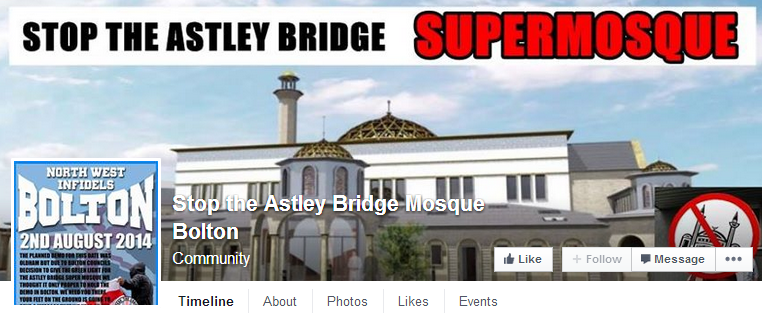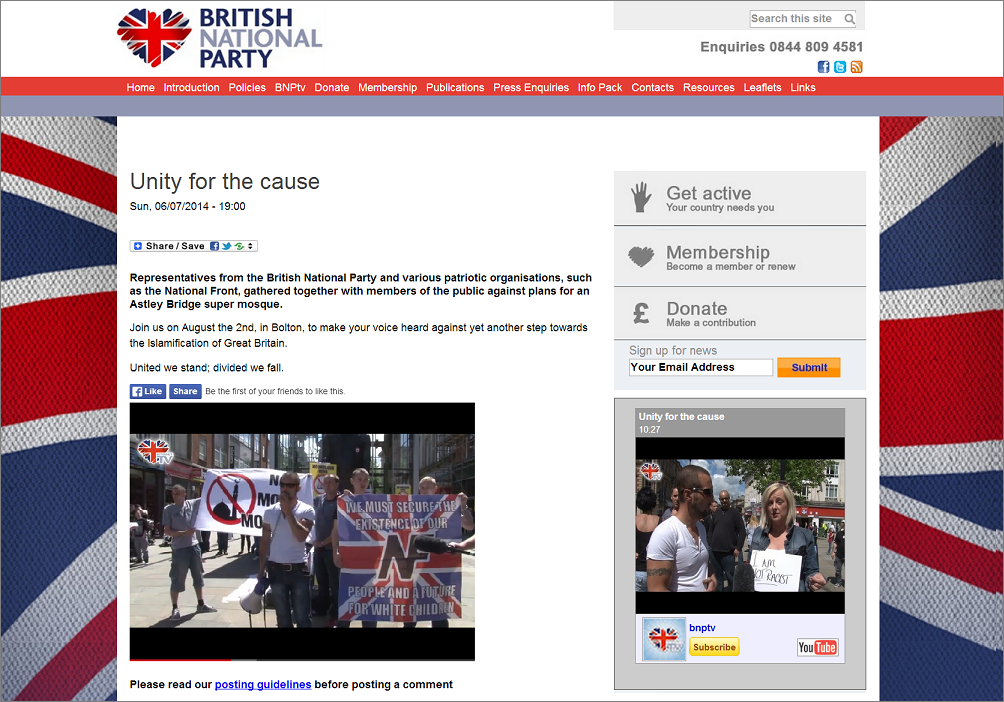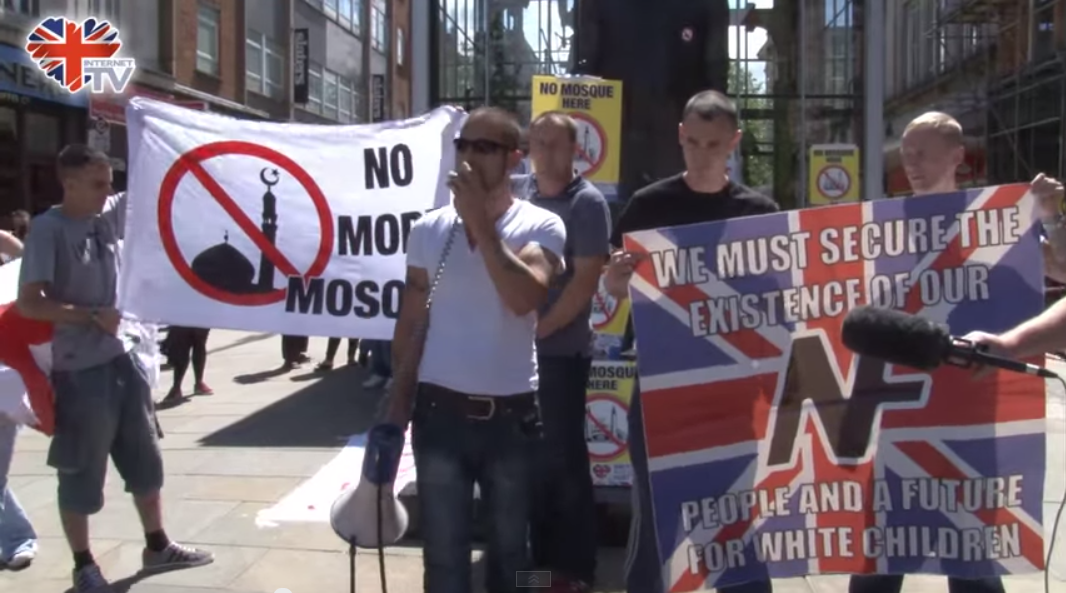
The far-right group the North West Infidels, which originated in a split in the English Defence League, will be holding a demonstration in Bolton next month against the planned so-called “super mosque” in Astley Bridge. There is an existing campaign based on the Facebook page Stop the Astley Bridge Mosque Bolton, which has already organised several anti-mosque protests, and as you can see they are now enthusiastically promoting the Infidels’ demonstration.
The Stop the Astley Bridge Mosque Bolton campaign is led by Bryn Morgan (aka Morgan Jones) who is an activist in the British National Party. It was also a bit of a giveaway that the campaign’s Facebook page originally featured the same banner that had appeared earlier on a BNP protest against the expansion of a mosque in Farnworth. The Bolton News went so far as to describe one of the Stop the Astley Bridge Mosque Bolton demonstrations, not inaccurately, as a “BNP rally”. In short, there is no question that the BNP has played a leading role in the campaign.
It might seem odd that the BNP is promoting an event organised by a white supremacist, neo-Nazi group like the Infidels. Central to Nick Griffin’s “modernisation” strategy, which he implemented after ousting John Tyndall as BNP leader in 1999, was a policy of hiding the party’s fascist ideology and presenting an “image of moderate reasonableness” to the public, with the aim of attracting electoral support. During the following period, and indeed until quite recently, the BNP would have steered clear of any public involvement with an organisation like the Infidels. But times have changed.
The European elections in 2009 represented the high water mark of the BNP’s political fortunes, with the party adding two MEPs to its fifty-odd councillors and London Assembly member. Although this fell well short of the achievements of the Front National in France, whose example had inspired Griffin’s “modernisation” strategy, the BNP’s electoral gains far exceeded anything previously accomplished by the extreme right in the UK. On top of this, Jim Dowson’s Belfast-based fundraising operation had provided the party with financial resources it had never enjoyed before.
Unfortunately for the BNP, success went to Griffin’s head. His arrogant and authoritarian behaviour antagonised political colleagues, provoking a spate of resignations, while serious financial problems also arose due to his reckless overspending. The result was the loss of many of the BNP’s leading figures, a mass exodus of members and the virtual collapse of the party’s organisation on the ground. With its difficulties compounded by an upsurge of support for UKIP, which siphoned off most of the racist vote, the BNP entered an extended crisis.
Even before the election results were announced on 25 May, it was clear that the party’s chances of retaining its seats in the European Parliament were non-existent, while it had already lost its seat on the London Assembly and its presence on local councils had been almost completely eradicated. The road to electoral success, which the “modernisation” strategy had been developed to pursue, was closed to the BNP for the foreseeable future.
Griffin’s solution would appear to be a retreat back to the sort of party Tyndall led – a smaller, more select organisation of fascists and hardcore racists, which will contest elections as a means of raising the party’s profile and winning new members but without any expectation of actually getting its candidates elected. Involvement with other far-right groupings of a more extreme character is therefore no longer to be avoided for fear of alienating voters. On the contrary, these organisations are now seen as a potential source of recruits to the BNP.
In line with this approach, when the BNP held an anti-mosque rally in Hemel Hempstead in May they billed it as a “unity demo” and extended an invitation to “all patriot groups” to participate. A week later, when Nick Griffin attended a BNP protest in Bolton against the Farnworth mosque, he happily stood alongside the National Front, who had turned out to support the demonstration, presumably at the invitation of the local BNP.
Within the BNP, Bryn Morgan has acted as an enthusiastic proponent of far-right unity. He gave a speech on that subject at a party meeting in St Helens in May, immediately following the BNP’s defeat in the European elections, in the course of which he helpfully provided some details about his own political background. “I’ve stood with various different factions prior to being involved with the BNP”, he told the audience. “It’s no secret that I stood with the English Defence League, I stood with the North West Infidels. I stood with various factions that tried to take a fight to the left wing, to the Muslims, out on the streets.”
(In addition, EDL News has reported on Morgan’s support for the National Front, who he urged to hold a demonstration in Bolton on the grounds that the town was “overrun with immigrant scum of every description”, and for the paramilitary British Counter Homeland Offensive group, whose declared aim is to organise “physical street resistance against anyone or anything that seeks to take or destroy our country”. If Morgan is well placed to argue for unity among the various fragments of the far right, it is because he seems to have been involved with most of them himself.)
Whereas association with groups like the Infidels had previously been rejected as damaging to the BNP’s electoral credibility, Morgan told the St Helens meeting that it was now necessary to actively engage with such “patriotic street movements” in order to persuade them that the BNP is the party that can provide them with a political voice. He continued:
“Unity is the only way forward. If we can’t get unity amongst the right wing, if we can’t get unity amongst ourselves, we’re absolutely wasting our time. Because that’s the one thing that the Muslims do have over us, that’s the one thing the Asian community does have over us, and even the blacks. At the end of the day they will all pull together, they will all fight as a united front against ourselves.”
In response, Morgan argued, the BNP should build its own united front, by engaging in joint activity with groups like the Infidels and the National Front, whose political objectives it shared: “We may be under a different banner but we’re all singing from the same hymn sheet at the end of the day. We all do have a common goal. The sooner we can put aside the petty differences, the petty squabbles, the history that’s gone on, the better.”
Morgan also stated that he was intending to stand as a BNP candidate in Bolton in next year’s general election – presumably in the Bolton South East seat, currently held by Labour’s Yasmin Qureshi, where the BNP stood in 2010, winning 5% of the vote. (In that connection it’s worth noting that Stop the Astley Bridge Mosque Bolton, supposedly a non-party-political campaign concerned only with rallying opposition to the proposed new mosque, took time out to attack Yasmin Qureshi over her opposition to Israel’s war on Gaza.) Morgan reported that the Infidels had offered to work on his election campaign and said he welcomed their support.
The controversy over the Astley Bridge mosque has provided the BNP with an ideal opportunity to put its unity strategy into effect. Bryn Morgan and the Bolton branch have established a close working relationship with other far-right groups, including the Infidels and the National Front, with the explicit support of the party nationally.
Under the heading “Unity for the cause” the BNP website reported that its members had joined “various patriotic organisations, such as the National Front” in an anti-mosque protest in Bolton on 5 July. The BNP even posted a video of the demonstration which featured Bryn Morgan denouncing the capitulation of Labour politicians to Islam while standing next to an NF banner displaying the Fourteen Words – a Hitler-inspired, white-power slogan coined by a convicted far-right terrorist. BNP supporters were also urged to support the Infidels’ demonstration on 2 August “to make your voice heard against yet another step towards the Islamification of Great Britain”.
Whether this alliance will hold together is questionable. The video of the 5 July demonstration also includes an interview with Kevin McMahon of the NF who bluntly rejected the BNP’s suggestion that their united struggle against Islam was strengthened by the presence of a Hindu anti-mosque protester. “As far as I’m concerned they shouldn’t be in our country either”, McMahon retorted. And even allowing for his turn towards building a narrower, more hardline party, is Griffin really happy for the BNP to be associated with acts of mindless hooliganism like the violent disruption of the Bolton council planning committee meeting that agreed to the Astley Bridge mosque development? It hardly gives the impression of political seriousness.
The task of the BNP’s opponents has also been assisted by this new policy of far-right unity. Exposing the BNP’s actual character is certainly much easier now than it was when Griffin was carefully cultivating an image of political respectability for his party. The mask of moderation has been dropped and the BNP stands revealed as the fascist organisation it always was.


